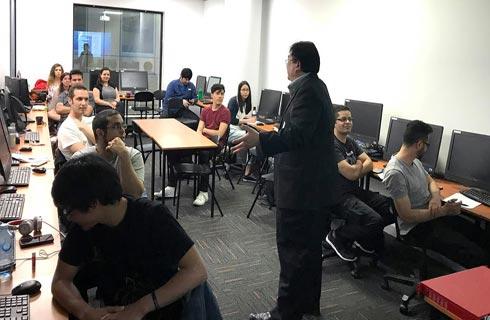理学研究生文凭-食品科学
Postgraduate Diploma in Science - Food Science

学历文凭
Postgraduate Diploma

专业院系
Division of Sciences

开学时间

课程时长

课程学费

国际学生入学条件
Admission to the programme shall be subject to the approval of the Pro-Vice-Chancellor (Sciences).
Every applicant shall have fulfilled one of the following condition
- have been admitted to the degree of Bachelor of Science majoring in the subject or subjects of study proposed
- have been admitted with the status of one who is entitled to proceed to the diploma
- have a qualification acceptable to the Pro-Vice-Chancellor and produce evidence satisfactory to the Pro-Vice-Chancellor of ability to proceed to the diploma.
English language requirements
IDP—雅思考试联合主办方

雅思考试总分
6.5
- 雅思总分:6.5
- 托福网考总分:90
- 托福笔试总分:160
- 其他语言考试:Pearson Test of English (PTE) Academic - Overall score of 58 with no communicative skills score below 50.
CRICOS代码: OO0018
申请截止日期: 请与IDP联系 以获取详细信息。
课程简介
Food production and quality is becoming increasingly important globally. Consumers want foods that are new and exciting, while also being nutritious, safe, tasty, convenient and produced in an environmentally responsible manner. Food companies need to cost-effectively produce foods that meet increasingly diverse market needs. Regulatory agencies insist foods conform to legislation around composition and safety. The challenge for the food scientist is to blend biology, chemistry, consumer research and nutrition to solve the problems of developing a safe, healthy, sustainable and nutritious food supply for people everywhere.
相关申请
 预科
预科 奖学金
奖学金 实习机会
实习机会 在校学习
在校学习 跨境学习
跨境学习 校园授课-线上开始
校园授课-线上开始 在线/远程学习
在线/远程学习
开学时间&学费
学费信息仅供参考,请与IDP联系以获取详细信息
| 开学时间 | 时长 | 学费 | 地点 |
|---|
学校排名

世界排名201
数据源:
泰晤士高等教育世界大学排名
关于奥塔哥大学

成立于1869年的奥塔哥大学是新西兰第一所大学,拥有丰富而杰出的历史。奥塔哥大学在研究和教学方面享誉世界,在QS世界大学排名中位列全球前1%。奥塔哥大学在商业、健康科学和人文科学等领域提供了大量而多样化的学习选项。学生可以从200多门课程中选择。该大学在就业能力、国际化、教学和研究等方面均被QS评为五星。根据高等教育委员会(TEC)的教育表现指标,奥塔哥大学在学生表现和留存率方面也被评为新西兰第一。这强调了奥塔哥为学生提供的教育质量。该机构在新西兰各地都有校区,在达尼丁、惠灵顿、奥克兰、基督城和因弗卡吉尔都有校区。奥塔哥大学的学生群体也是多元化的,达尼丁校区85%以上的学生来自城市以外,全校有3000名国际学生入学。奥塔哥大学的学生享有良好的毕业成果,95%的学生在毕业后继续深造或就业。
本校相关课程
其他相关课程

生物技术硕士
 昆士兰大学
昆士兰大学泰晤士高等教育世界大学排名:80
学历文凭
Masters Degree (Coursework)
开学日期
课程费用总额


理学学士(荣誉学位)
 迪肯大学
迪肯大学泰晤士高等教育世界大学排名:206
学历文凭
Bachelor Degree with Honours
开学日期
课程费用总额


理学硕士(研究)-应用研究
 南昆士兰大学
南昆士兰大学学历文凭
Masters Degree (Research)
开学日期
课程费用总额


生物技术硕士
 墨尔本大学
墨尔本大学学历文凭
Masters Degree (Coursework)
开学日期
课程费用总额


应用科学副学士
 皇家墨尔本理工大学
皇家墨尔本理工大学学历文凭
Associate Degree
开学日期
课程费用总额


理学学士(纳米技术)
 弗林德斯大学
弗林德斯大学泰晤士高等教育世界大学排名:307
学历文凭
Bachelor Degree
开学日期
课程费用总额










 新西兰
新西兰





